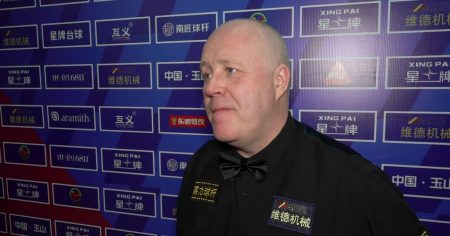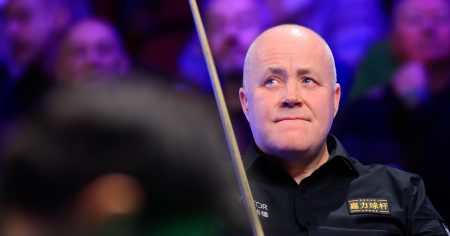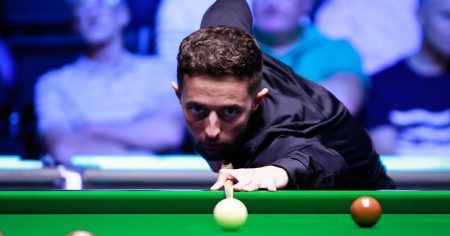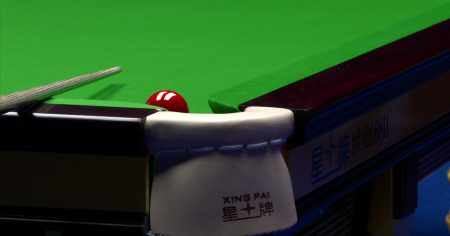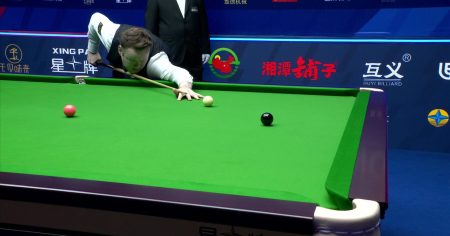Neil Robertson’s first-round Masters clash against John Higgins was a rollercoaster of momentum swings, punctuated by a moment of remarkable sportsmanship that underscored the Australian’s integrity and respect for the game. Trailing 5-1, seemingly on the brink of an early exit, Robertson clawed his way back into the match, eventually securing a dramatic 6-5 victory. However, the match will be remembered not just for the final result, but also for Robertson’s self-imposed foul, a testament to his unwavering commitment to fair play. Facing a difficult shot, Robertson’s cue inadvertently grazed the pink ball before making contact with the intended red. Recognizing the foul instantly, he immediately called it on himself, assisting referee Jan Verhaas in upholding the integrity of the game. This act of sportsmanship served as a pivotal moment, reflecting Robertson’s character and setting the stage for his remarkable comeback.
The match began with Higgins asserting his dominance, quickly establishing a commanding 5-1 lead. Robertson appeared out of sorts, struggling to find his rhythm and seemingly unable to counter Higgins’ strategic play. The pressure mounted as the prospect of an early exit loomed large. However, it was precisely at this juncture, facing a seemingly insurmountable deficit, that Robertson demonstrated the resilience and determination that have marked his illustrious career. His self-called foul, while seemingly insignificant in the grand scheme of the match, became a symbol of his renewed focus and determination. Rather than letting the setback demoralize him, Robertson used it as a catalyst to regain his composure and mount an improbable comeback.
The sixth frame proved to be the turning point in the match. Following the self-called foul incident, Robertson appeared to find a renewed sense of purpose. He began to pot balls with greater accuracy, his positional play improved significantly, and his tactical acumen sharpened. He managed to secure the frame, halting Higgins’ momentum and injecting a glimmer of hope into his own prospects. This frame became the foundation upon which Robertson would build his remarkable resurgence. The momentum had palpably shifted, and the previously dominant Higgins began to show signs of unease.
Robertson’s resurgence continued in the subsequent frames. He maintained the pressure on Higgins, capitalizing on any slight misstep by his opponent. His shot-making became increasingly confident, and his tactical execution grew more astute. Higgins, who had appeared unflappable earlier in the match, now found himself on the defensive, struggling to regain the control he had once held so securely. The crowd, initially anticipating a straightforward Higgins victory, was now captivated by Robertson’s spirited fightback, the atmosphere electrifying with each passing frame. The match had transformed from a potential rout into a gripping contest of wills.
As the match progressed to the final frame, the tension in the arena was palpable. Robertson, having fought his way back from the brink of defeat, now stood on the cusp of victory. Higgins, despite his earlier dominance, was now battling to avoid a crushing defeat. The final frame was a tense affair, with both players exhibiting nerves of steel. Robertson, however, managed to hold his nerve, potting the final ball to secure a dramatic 6-5 victory. The crowd erupted in applause, acknowledging both Robertson’s remarkable comeback and his unwavering sportsmanship.
Robertson’s victory over Higgins was more than just a first-round win; it was a testament to his resilience, his unwavering determination, and his commitment to fair play. The self-called foul, a seemingly small gesture, became a symbol of his character and integrity, highlighting the importance of sportsmanship in the heat of competition. His comeback from a 5-1 deficit underscored his mental fortitude and his ability to perform under pressure. The match served as a reminder that in snooker, as in life, character and resilience can often prove more decisive than initial advantage. Robertson’s performance resonated far beyond the confines of the arena, demonstrating the power of sportsmanship and the captivating drama of a comeback against all odds.







